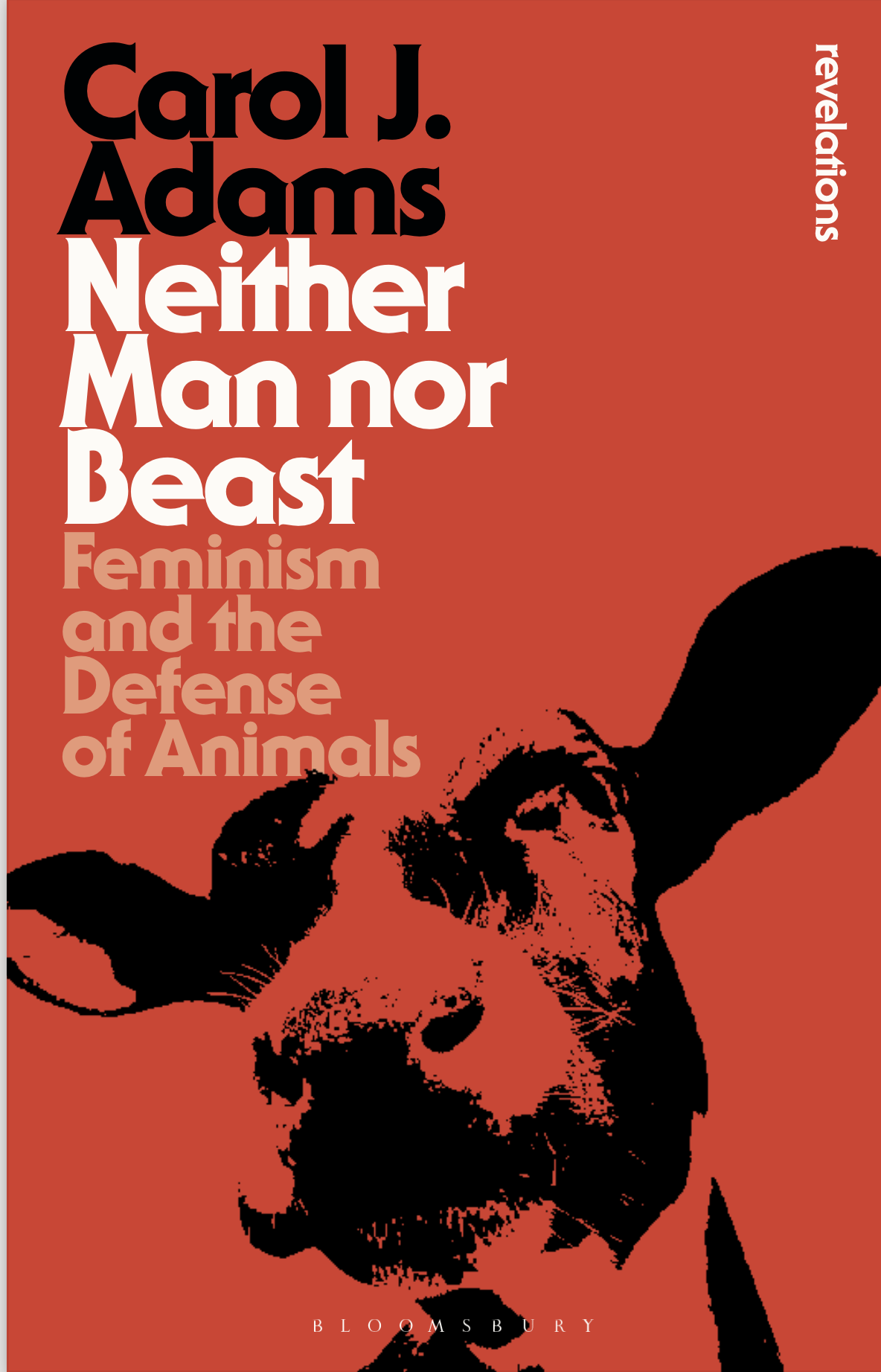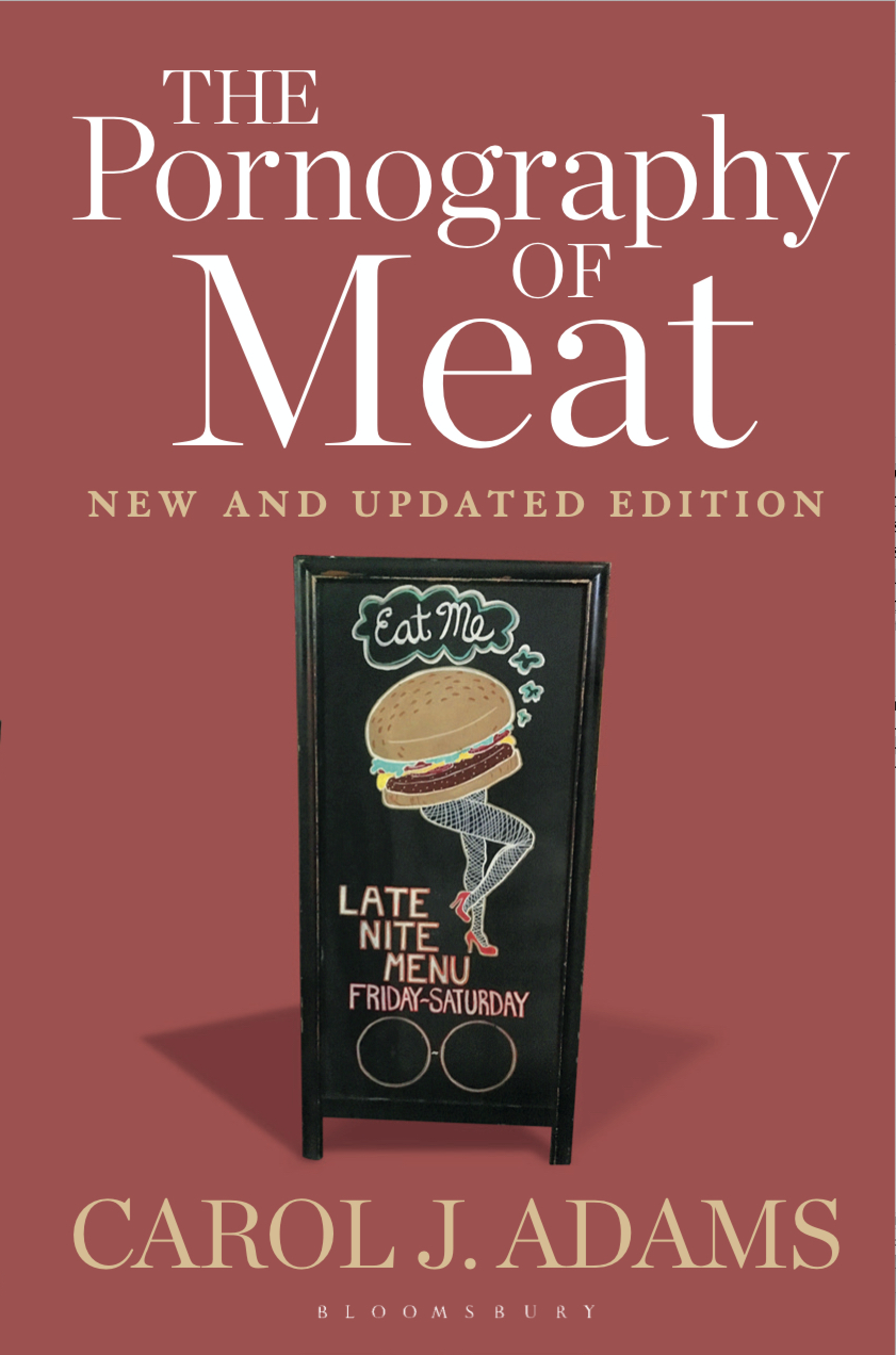Neither Man nor Beast: Feminism and the Defense of Animals
The 1993 volume, Neither Man Nor Beast collected reflections on animal advocacy, vegetarianism, and ecofeminism from the often-difficult-to- locate sources in which many of the articles originally appeared, and includes two important and completely new chapters. More than a book of theory, Neither Man Nor Beast is an enlightened call to action.
In 2018, Bloomsbury Revelations added it to their list with a new printing, announcing that this landmark work of animal rights activism explores the intersections and common causes of feminism and the defense of animals. Neither Man Nor Beast explores the common link between cultural attitudes to women and animals in modern Western culture that have enabled the systematic exploitation of both. A vivid work that takes in environmental ethics, theological perspectives and feminist theory, the Bloomsbury Revelations edition includes a new foreword by the author and new images illustrating the continuing relevance of the book today.
Choice said of this volume, "[Adams's] thinking is brilliant and original, and this volume belongs in every women's studies, theology, and environmental ethics collection."
Information from my publisher here.
The Pornography of Meat
Information from my publisher and table of contents for the new edition here.
For 30 years, since the publication of her landmark book The Sexual Politics of Meat, Carol J. Adams and her readers have continued to document and hold to account the degrading interplay of language about women, domesticated animals, and meat in advertising, politics, and media. Serving as sequel and visual companion, The Pornography of Meat charts the continued influence of this language and the fight against it.
This new edition includes more than 300 images, most of them new, and brings the book up to date to include expressions of misogyny in online media and advertising, the #MeToo movement, and the impact of Donald Trump and white supremacy on our political language. Never has this book--or Adams's analysis--been more relevant.
Praise for the first edition of The Pornography of Meat:
Is meat consumption linked to physical and sexual violence? Feminist, vegetarian, and activist Adams (The Sexual Politics of Meat) thinks so, and in 16 provocative essays she tells us why.
These essays explore such diverse topics as the objectification of animals and women, the power of exploitative language to devalue, female bodies and body parts as advertisements for meat products, and the sexist aspects of lynching. In the especially controversial "Male Chauvinist Pig?" Adams deplores PETA's (People for the Ethical Treatment of Animals) use of nude photographs and posters and argues that there is no need to exploit women to save animals. Each essay is supported by documentation, including a dazzling array of visual images that reproduce cartoons, posters, magazine covers, restaurant menus, advertisements, etc. These images, some of which are disturbing and difficult to view, significantly heighten the book's impact and are its best feature. Even readers who do not share Adams's views should find themselves challenged and perhaps even enlightened by this unique work. Highly recommended for academic libraries and for public libraries with collections in vegetarianism.
– Library Journal
Adams’s new book, The Pornography of Meat, collects some of the material in support of her ideas that she has been sent by admirers of her work. Here Adams focuses specifically on the relationship between the way we see meat (and the word itself is, Adams suggests, a reassuring euphemism), and the way women are presented in pornography.
Adams’s definition of pornography is broad, taking in everything from how men look at prostitutes to Hustler magazine and sexually provocative adverts. Her target is the “male gaze”, and how it transforms both women and animals into objects that want to be consumed, metaphorically or literally. “Pleasurable consumption of consumable beings is the dominant perspective of our culture”, Adams argues. In support of this assertion The Pornography of Meat presents a vast range of examples in which meat is sexualized, or in which women are presented as meat. Adams’s argument is more subtle than simply equating the two. While a model on a catwalk may well feel like “a piece of meat”, the cow in the abattoir is unlikely to compare its [Adams would have “her”] death and evisceration to the typical modeling job. What Adams instead argues is that the image of the “Playmate” proffering her rump to the reader and the restaurant menu with the happy cow inviting us to eat them reinforce and evoke each other. Eating meat is presented as sexy, and women are presented as animals. Furthermore, Adams argues that in both cases the image takes the place of the subject themselves, and in doing so converts someone’s exploitation into someone else’s pleasure. “By sexualizing dominance”, Adams writes, “pornography and advertising ... make it fun.” Where her critics accuse Adams of anthropomorphizing animals, this book puts the case that it is in fact the meat-eating culture that presents animals as our smiling friends, complicit in their own consumption.
Adams describes herself as an “activist immersed in theory” and The Pornography of Meat is a deliberately polemical exercise in consciousness- raising rather than a formal academic study. The book intends to disrupt the objectifying male gaze by presenting a way of “seeing the same thing differently”, as she puts it. By taking her material out of its usual context and rearranging it in sixteen themed chapters, Adams seeks to disrupt what is taken for granted about images of animals and women, and to expose the ideology that she argues underlies the presentation of both. Her approach is frequently exhilarating, but at times can be exasperating. The book is highly readable, her material often eye-opening.
– Times Literary Supplement
Animals and Women: Feminist Theoretical Exploration
Edited with Josephine Donovan (Duke University Press, 1995)
Animals and Women is a collection of pioneering essays that explores the theoretical connections between feminism and animal defense.
Offering a feminist perspective on the status of animals, this unique volume argues persuasively that both the social construction and oppressions of women are inextricably connected to the ways in which we comprehend and abuse other species. Furthermore, it demonstrates that such a focus does not distract from the struggle for women’s rights, but rather contributes to it.
This wide-ranging multidisciplinary anthology presents original material from scholars in a variety of fields, as well as a rare, early article by Virginia Woolf. Exploring the leading edge of the species/gender boundary, it addresses such issues as the relationship between abortion rights and animal rights, the connection between woman-battering and animal abuse, and the speciesist basis for much sexist language. Also considered are the ways in which animals have been regarded by science, literature, and the environmentalist movement. A striking meditation on women and wolves is presented, as is an examination of sexual harassment and the taxonomy of hunters and hunting. Finally, this compelling collection suggests that the subordination and degradation of women is a prototype for other forms of abuse, and that to deny this connection is to participate in the continued mistreatment of animals and women.
Praise for Animals and Women: Feminist Theoretical Exploration
This is an outstanding collection. The authors write expertly on the surprisingly intimate relation between attitudes toward animals and women in our culture.
From reading their work on pornography, the treatment of ‘laboratory’ animals, hunting, wife-beating, and factory farming I have learned a tremendous amount. This superbly edited volume makes an important contribution to the cause of animal and human liberation.
– Jane Tompkins, Duke University
The best of feminist animal rights theorizing ... reimagines a human relationship to the nonhuman world by locating action and theory in the lived world and moral universe of women’s identity and on the basis of feminist political insights.
As a genre, feminist animal rights theorizing thus emerges as one of the sharpest cutting edges of contemporary philosophical and environmental work. Four anthologies encompass the range of this work: a special issue of Hypatia edited by Karen Warren in 1991; Ecofeminism: Women, Animals, Nature, edited by Greta Gaard (1993); Carol Adams and Josephine Donovan’s anthology Animals and Women: Feminist Theoretical Explorations (Adams and Donovan 1995); and a second anthology by the same editors, Beyond Animal Rights: A Feminist Caring Ethic for the Treatment of Animals (Donovan and Adams 1996).
– Joni Seager, “Rachel Carson Died of Breast Cancer: The Coming Age of Feminist Environmentalism”
Signs 28, no. 1 (Spring 2003), pp. 445-72.
Derrida and The Sexual Politics of Meat
Carol J. Adams and Matthew Calarco
from Meat Culture, edited by Annie Potts
What sorts of intersections, associations, or refusals might be found between Jacques Derrida’s work and The Sexual Politics of Meat? Carol and Matt decided that a discussion format might enable them to explore answers to this question. What follows represents a part of that larger conversation. While Carol’s work in decoding the sexual politics of meat stretches over more than thirty years, expanding into close consideration of the functioning of representations, Derrida’s elaboration on his neologism carnophallogocentrism remained largely suggestive and deferred. Carol and Matt recognize that this difference, among many other reasons, means that their goal never was to compare and contrast but to create a dialogue and exploration. They wish to thank Vasile Stănescu for suggesting that they explore this topic together.
Read the entire article here.



